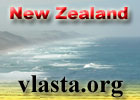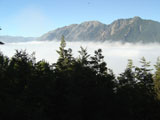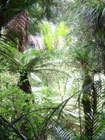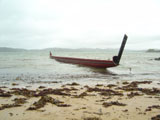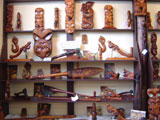
From archaeological evidence we know that first people arrived to New Zealand's islands called Aotearoa (Land of the Long White Cloud) around 700 AD. They were from Melanesia and Indonesian islands. First Maori ancestors, Polynesians, settled on the islands from around 1000. They arrived in a series of waves over several generations.
 At the beginning the main source of food consisted of fish, shells and other see gifts. Easy prey were also flightless birds such as Moa, Kiwi or kakapo. Moa grow up up to three meters. Agriculture starts with second wave of settlements called"Classic Maori period". Devastating human influence changed fauna and flora. Moa was hunted into extinction by about the late 17th century, wide spread forest were changed to farmlands and introduced dogs (kuri) and rats (kiore) damaged populations of ground-dwelling birds.
At the beginning the main source of food consisted of fish, shells and other see gifts. Easy prey were also flightless birds such as Moa, Kiwi or kakapo. Moa grow up up to three meters. Agriculture starts with second wave of settlements called"Classic Maori period". Devastating human influence changed fauna and flora. Moa was hunted into extinction by about the late 17th century, wide spread forest were changed to farmlands and introduced dogs (kuri) and rats (kiore) damaged populations of ground-dwelling birds.
Maori tribes were getting more warlike with growing population. During 1300-1500 centuries several tribes wiped out and cannibalism also became present at that time.
Abel Tasman discovered during his voyage in 1642 around Australia western coast of New Zealand. He did not stay long after his three members were killed in Golden Bay. He called this land after the Netherlands province of Zealand. Forgotten New Zealand was rediscovered by English explorer James Cook in 1769. Captain Cook was mapping this islands during his three voyages till 1777.
Since 1792 Europeans were comming in increasing numbers. Often they were prisoners, sometimes there were campaigns organized from Britain in order established new settlements. First colonists fish whales, seals or bring cows with them. This land was soon paradise for English, French and American fisherman. After several revolts Maori started cooperations with Pakeha (white man). They supply them with food and with guns started tribal fights. In 19th century Maori population was falling dramatically.
British government decided about the annexation of New Zealand in 1838. Wiliam Hobson run negotiation with tribal chiefs since 1839 and in 1841 he was designated like a governor. Chiefs ceded their sovereignty to the Queen's protection and the granting to Maori people all citizenships rights, privileges and duties enjoyed by citizens of England.
Increasing numbers of Pakeha and breaks of "Treaty of Waitangi" leads to "Land Wars" in 19th century between Maori and European settlements in which were involved forces from Australia and Great Britain.
Thanks to wars northern island was not so developed like southern one where mainly agriculture was established. The country became "farm of England". Women got already right to vote in 1893, 25 years ahead of Great Britain, USA and 75 years before in Switzerland. New Zealand has been fully independent since 1947.
